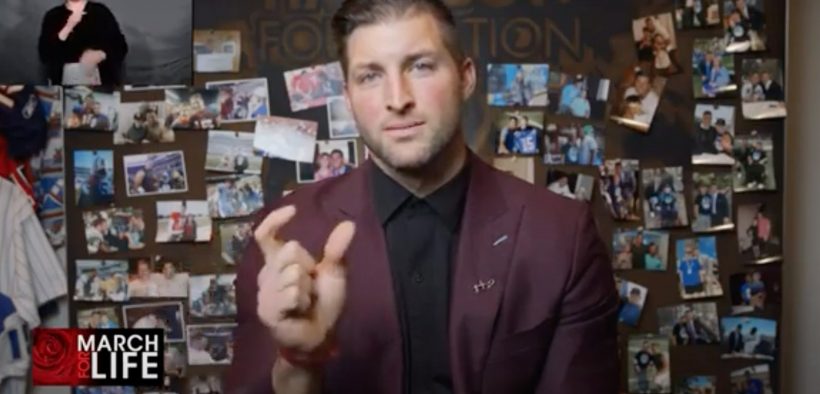At March for Life, a Pivot Away from Trump and Toward ‘Unity’

A mostly virtual version of the 48th annual pro-life gathering convened in Washington, D.C., on Friday (Jan. 29) featuring pre-recorded speeches from lawmakers, faith leaders and former football star Tim Tebow who pushed for unity and made appeals to President Biden to enact pro-life legislation.
March for Life Director Jeanne Mancini kicked off the event by announcing its theme: “Together strong, life unites.”
“With all of the division and unrest, with the fear in our country, we felt strongly that this year’s theme should call for a time of coming together,” she said.
What followed was an unusual iteration of the gathering that contrasted sharply with recent years when references to former President Trump, his policies and his rhetoric were commonplace. This year, however, speakers at the March for Life tended to avoid his name altogether. Instead, many made calls for unity, stressed the diversity of the movement, and appealed to President Biden directly.
Mancini warned that Biden’s administration was poised to make “divisive, pro-abortion, pro-death” policy decisions but urged the president to “consider unifying, pro-life policy decisions.”
References to faith filled the proceedings. Republican Congressman Chris Smith of New Jersey invoked faith while arguing that pro-life activists should remain respectful in their debates with opponents.
“Today we again face enormous challenges and recommit to persevere through prayer, fasting and good works, and respect—including those with whom we fundamentally disagree, even when it’s not reciprocated,” he said.
He later added: “These children need the president of the United States to be their friend and advocate, not another powerful adversary.”
Access to MinistryWatch content is free. However, we hope you will support our work with your prayers and financial gifts. To make a donation, click here.
At least two of the speakers were Democrats. Angie Hatton, the minority whip in the Kentucky House of Representatives, said her Christian faith guides her votes to “protect unborn life” but suggested the movement needs support from both parties.
“I believe in this year’s theme: together strong, life unites,” said Hatton, who serves on the national advisory board for Democrats for Life. “I believe we need a bipartisan effort to end abortion, but not just by outlawing it, but also by eliminating the reasons women seek abortions in the first place.”
Hatton argued that the pro-life movement should embrace policies that are “pro-life for all life,” such as making healthcare more accessible to impoverished people, paying working mothers a living wage, helping to make childcare and preschool affordable and funding foster care and adoption services.
“In the same way that I found the political courage to speak the pro-life message as a Democrat, I’m asking pro-life Republican legislators to find the courage to support not only pro-life legislation, but also pro-babies and moms legislation,” she said.
The lineup also featured several prominent conservative religious figures. Joseph F. Naumann, Catholic Archbishop of Kansas City, Kansas, and Cissie Graham Lynch, a senior adviser to the Billy Graham Evangelistic Association, both offered prayers. J.D. Greear, president of the Southern Baptist Convention, told a story of how a college student decided not to have an abortion after hearing him speak.
“I march because actual lives are at stake,” he said.
The headliner of the event was the former NFL quarterback Tim Tebow. A vocal evangelical Christian, Tebow told how his mother, a missionary, decided to give birth to him despite difficulties with his pregnancy and advice from doctors suggesting she have an abortion.
“I’m so grateful that my mom gave me a chance at life,” he said, before adding, “You know who else I believe stood and stands for life? Our savior, Jesus.”
Tebow then gave a lengthy, faith-filled talk in which he repeatedly cited Scripture.
“I’ve given so much of my life for sports,” he said. “People might say I was passionate about that, but that’s for trophies that rust and for praise of people that are going to forget your name. Does that really matter? I don’t think so. But you see, being passionate about Jesus, and passionate about life, and passionate about people and passionate about those that have been thrown away and neglected and forgotten—that is worthy, that is meaningful, that is real significance.”
After he finished, a gaggle of speakers and representatives of the movement wearing red March for Life masks led a small in-person march in downtown Washington that concluded at the U.S. Supreme Court.
“This year we just sensed we needed to talk about unity and diversity creating unity,” Mancini told a reporter from EWTN as she marched.
More than 10,000 viewers joined online to watch the rally, according to WORLD, and about 6,000 stayed to watch 60 pro-life leaders march to the Supreme Court.
And since many of the pro-life marchers who normally travel to D.C. for the event were unable to do so this year, some met for local rallies in their communities, coinciding with the national march.
Shawna Weber joined one of those rallies, led by Students for Life in the Chicago area. A sophomore at the College of Lake County, she told WORLD that she was disappointed she couldn’t attend the national march in person, but she recognized the benefit of staying closer to home.
“I feel like it is a blessing that we are able to focus on our local community,” Weber said. “Doing it on a local level—that’s really, I think, the goal for everybody, you know…You want to help the movement where you are.”



